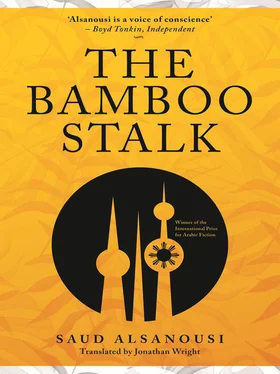I waited for him in the car park. He arrived in a yellow sports car. I cursed my bicycle and taxis and buses. He shook my hand and said, ‘It’ll be a surprise for the other guys.’
‘I wonder if they’ll remember me,’ I said.
* * *
‘One, two, three.’
I counted the pairs of shoes at the diwaniya door before we went in. Taking your shoes off isn’t just for people who go to mosques. I turned to Mishaal and pointed to the shoes by the door: ‘There are three people inside and you’re the fourth. Where’s the fifth?’ ‘This is Turki’s diwaniya , and he comes in from the other door from the inner courtyard,’ he said with a laugh. So there was an inside door and an outside door.
Mishaal pushed the door open and waved me in. The floor was spread with carpets. There were no sofas, just mattresses on the ground for sitting on, with hand rests between them and cushions against the walls to lean back on. One of the men was playing with his mobile phone, another was lying in the corner under an open window blowing cigarette smoke into the air. I recognised him immediately: he was the one with the oud. Two of them were glued to the television screen. I thought they were watching a football match, but then I noticed they were holding controllers and playing with the buttons. They were busy playing football on PlayStation. No one paid us any attention except for the guy with the cigarette. He looked from me to Mishaal in surprise. ‘ As-salam aleekum ,’ Mishaal said. I quickly added my own ‘ As-salaam aleekum .’
Everyone turned to us. ‘ Wa aleekum as-salam ,’ they said. Mishaal spoke to them in Arabic, referring to me as ‘our Kuwaiti friend’. Their reactions varied from smiles to surprise. Some of them laughed. They all gathered around me in disbelief, saying things like ‘It’s you?’ or ‘I didn’t believe you were Kuwaiti’ or ‘We forgot all about you as soon as we left that place’.
I put out my hand to the guy with the cigarette and Mishaal introduced us. ‘This is Turki,’ he said. I shook his hand. I leaned over and brushed cheeks with him the way Kuwaitis greet each other. Mishaal pointed to the man who’d been playing with his mobile phone and introduced me. ‘That’s Jabir,’ he said. Then he pointed towards the two who were sitting in front of the television, ‘Abdullah and Mahdi,’ he said. I shook hands and brushed cheeks with all of them in turn.
* * *
They were amazing. So cheerful and friendly — that’s what I can say about the Boracay gang. I was happy to meet them and enter their world.
How could a country have so many faces? Which of these many faces was Kuwait’s real face ? I wondered.
I dropped in on the diwaniya every day, or almost very day, depending on Turki, who called me up whenever the gang was meeting at his place. Fortunately Turki’s house was in Adailiya, which wasn’t far from Jabriya. The others lived nearby too, except for Abdullah, who lived in some remote area. But that didn’t mean Abdullah needed a plane to get to Turki’s place, as he might in some remote parts of the Philippines, because it only takes about half an hour, give or take a little, to reach the most remote residential area in Kuwait.
Sometimes I went to the diwaniya alone after work on my bike. Sometimes the Kuwaitis would take turns coming to my place to give me a lift. Everything would have turned out as in my dreams, if it hadn’t been for the language barrier, which I couldn’t overcome, though I could pick out some words when they spoke to each other in Arabic. I felt really sorry for my friends when they felt they had to abandon their own language just to bring me into their world. Mishaal spoke English fluently, Turki and Jabir less so, while Abdullah and Mahdi spoke to me the way Grandmother spoke to Babu, Raju, Lakshmi and Luzviminda. I think it’s wonderful when people stretch language to the limit, peppering their own language with words from other languages, or supplementing it with gestures, just so that they can tell you how they feel towards you: ‘I am happy katheeran li-anni see you after long time’, for example. Kind words don’t need translating. You only have to look at the face of the person speaking to understand how they feel, even if they’re speaking a language you don’t understand. Abdullah didn’t realise this when he told me how happy he was to meet me again.
Despite their differences their craziness united them. They lived in separate neighbourhoods and belonged to different families. Turki and Jabir were of high social rank, maybe level with the Taroufs. Mishaal didn’t recognise such things. He thought that family wealth was enough to break down all these class distinctions. And he, by the way, was very rich. As for Abdullah and Mahdi, I don’t know much about them, perhaps because their English was poor. All I know about Abdullah is that he was more committed to his religious observances than his friends and more modest in the way he dressed. He seldom wore anything other than the traditional thobe. Mahdi didn’t speak much. I hardly heard his voice except when he screamed in delight or anger at the result of a football match between him and Abdullah.
I did provide one service to the crazies, perhaps the most important thing I had done for them since we had met. Only when I was with them in the diwaniya could they play their favourite card game, koutbo sitta , which requires six players. It may seem trivial but for the first time in Kuwait I felt that my presence mattered, even if it was only to make up the number needed for a game of cards.
We spent our time in the diwaniya playing cards or watching football matches, either real ones or virtual on-screen games between Abdullah and Mahdi. Sometimes Turki would strum his oud, and if we were bored, they would start talking about their love affairs. Abdullah was very meticulous about performing his prayers on time five times a day. Could I do that? Five times a day? When I asked him how he could keep it up like that, he answered confidently, ‘It makes me happy to have you with us in the diwaniya day after day. Wouldn’t you like to have God with you (he raised his hand and spread his fingers) five times a day?’
We used to pray together, led by Abdullah. I don’t know why I prayed. Did I honestly want to, or did Abdullah make me feel embarrassed? Why didn’t Mishaal feel at all embarrassed?
Although I didn’t know the real reason why I prayed with them, that doesn’t mean that I wasn’t sincere when I prayed, even if I didn’t know how to pray properly. I went through the motions of praying like them, but I said the prayers in a way that no else did. Perhaps the only word that we all spoke aloud and in unison was ‘Amen’.
Mishaal didn’t budge when Abdullah called us to prayer by shouting ‘ Allahu akbar, Allahu akbar ’. The others quickly formed a line behind Abdullah. We went through the motions of the ritual by following what Abdullah did, and said ‘ Allahu akbar ’ between each stage and the next.
Mahdi was also meticulous about praying but he prayed in a slightly different way. I was probably the only one who noticed this because I sometimes lost concentration and absent-mindedly watched the others. When we were kneeling with our hands on our knees, I examined their feet. Turki’s toes were very small and close together. Mahdi’s feet were big and white and his toes were covered in thick hair. Turki and Jabir pressed their hands to their chests when they were standing upright during prayer, but Mahdi didn’t do that. We prostrated ourselves, bending down till our foreheads touched the carpet. Mahdi put a paper handkerchief on the carpet and touched that with his forehead. After prayers once, I stupidly asked Mahdi if he had an obsession with hygiene. He smiled and shook his head. Seeing I was confused, Abdullah stepped in to clarify some things about Islam I didn’t understand. ‘Islam. . sect. . Sunni. . Shi’a.’ It all seemed complicated to me, or perhaps Abdullah’s language — Arabic interspersed with broken English and mysterious hand gestures — didn’t work for him this time. I shook my head to show I didn’t understand. Mishaal intervened. ‘We’re Catholic Muslims, and they’re Protestant Muslims,’ he said. Everyone roared with laughter, but nonetheless I understood from Mishaal what Abdullah had failed to explain.
Читать дальше












